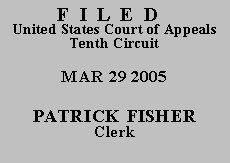 UNITED STATES COURT OF APPEALS
UNITED STATES COURT OF APPEALS
 UNITED STATES COURT OF APPEALS
UNITED STATES COURT OF APPEALS
FOR THE TENTH CIRCUIT
| MICHAEL L. SAVILLE,
Plaintiff - Appellant, v. INTERNATIONAL BUSINESS MACHINES CORPORATION, a New York corporation, Defendant - Appellee. |
No. 03-4172 (2:02-CV-598-TC) (D. Utah)
|
In their supplemental briefs, both parties acknowledge that the appeal in this case (Saville II) is now moot because the district court has reached a final decision in Mr. Saville's earlier-filed case (Saville I). See Aplt's Supl. Br. at 2 ("With respect to the issue of mootness, Mr. Saville recognizes that Judge Benson's recent decision in Saville I is a final decision and, as a practical matter, probably does render Mr. Saville's appeal in the instant case ("Saville II") moot."); Aple's Supl. Br. at 4 ("the court should . . . summarily dismiss his present appeal as moot . . . .").
Whether we should dismiss the case with prejudice, however, is disputed. Mr. Saville advocates a dismissal without prejudice, which would leave open the possibility of him refiling this appeal in Saville II if he successfully appeals Judge Benson's recent decision in Saville I. IBM urges us to dismiss the appeal with prejudice as a matter of law and asserts that under res judicata principles, we must either dismiss the appeal as moot or affirm the district court's judgment.
"Under res judicata, or claim preclusion, a final judgment on the merits of an action precludes the parties or their privies from relitigating issues that were or could have been raised in the prior action." Satsky v. Paramount Comm., Inc., 7 F.3d 1464, 1467 (10th Cir. 1993) (internal quotations omitted). Res judicata requires the satisfaction of four elements: (1) the prior suit must have ended with a judgment on the merits; (2) the parties must be identical or in privity; (3) the suit must be based on the same cause of action; and (4) the plaintiff must have had a full and fair opportunity to litigate the claim in the prior suit. Nwosun v. Gen. Mills Rests., Inc., 124 F.3d 1255, 1257 (10th Cir. 1997).
Mr. Saville concedes that the second, third, and fourth elements of res judicata are satisfied. He acknowledges in his opening brief that "the parties are the same, and, for the sake of argument, Mr. Saville is willing to concede that although the suits are based on different causes of action, the suits are based on the same set of underlying facts and transactions." Aplt's Br. at 9. He also concedes the "opportunity" element: "Mr. Saville does not dispute that he had multiple opportunities to bring his claim of discrimination in violation of the Age Discrimination in Employment Act into the Fair Labor Standards Act lawsuit (referred to herein as 'Saville I')." Aplt's Reply Br. at 1.
Mr. Saville asserted in his original briefs that res judicata principles could not apply to Saville II because the first element of res judicata remained unsatisfied: Saville I had not yet proceeded to a final judgment on the merits. In the first sentence of the section of his brief entitled "Summary of Argument," he states "[t]he claims in Saville I had not yet proceeded to any judgment, much less a final judgment, therefore, the trial court should not have applied any res judicata principles such as claim preclusion or the rule against claim splitting to bar the claim in Saville II." Aplt's Br. at 7. He even asserted that "[c]ertainly, if the claims in Saville II could have been brought in Saville I, and if Saville I had proceeded to some final disposition or judgment, then the second, later, suit of Saville II would and should be precluded." Aplt's Br. at 11.
Judge Benson recently granted summary judgment in IBM's favor in Saville I. See Order & Opinion, Case 2:00-cv-681 in the District Court for the District of Utah, entered February 24, 2005. Coupled with Mr. Saville's acknowledgment in his reply brief that "he had multiple opportunities to bring his claim of discrimination in violation of the Age Discrimination in Employment Act into the Fair Labor Standards Act lawsuit," Aplt's Reply Br. at 1, this final judgment on the merits in Saville I compels us to conclude that Mr. Saville has conceded each element of res judicata as to the appeal in Saville II. Our review of the case also reveals that each element of res judicata is satisfied.
For the foregoing reasons, Mr. Saville's appeal in Saville II, Tenth Circuit case number 03-4172, is moot. We hereby dismiss the appeal with prejudice.
Entered for the Court
Robert H. Henry
Circuit Judge
*.This order and judgment is not binding precedent, except under the doctrines of law of the case, res judicata, and collateral estoppel. The court generally disfavors the citation of orders and judgments; nevertheless, an order and judgment may be cited under the terms and conditions of 10th Cir. R. 36.3.